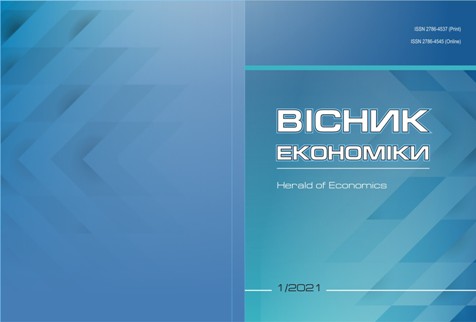Accounting and control of indebtedness according to electronic payments of food industry enterprises using information and communication technologies
DOI:
https://doi.org/10.35774/visnyk2023.01.050Keywords:
accounting, control, digitization of accounting, debt accounting, electronic transactions, enterprises, food industry, information and communication technologies.Abstract
Introduction. Digitization of socio-economic processes and the implementation of modern information and communication technologies in the currency and banking sphere have led to the evolution of the methodology of electronic settlements with counterparties. The latest stage in the development of electronic transaction systems is the information integration of counterparties into a single information environment of business relationships based on the principles of blockchain technology.
Purpose. The purpose of the article is to research the peculiarities of the organization of accounting and control of electronic payments and improvement of their methodology in the context of debt repayment in the conditions of the use of information and communication technologies.
Methods. Systemic, innovative, functional approaches and methods of generalization, bibliographic and comparative analysis were used in the process of realizing the established goal of scientific research.
Results. It is proved that the fundamental basis of the system of electronic transactions are electronic contracts, which form a database for the digitization of accounting and control processes. A list of permanent and variable accounting data provided by the electronic payment system and the company’s divisions for the digitization of accounting for the occurrence and repayment of receivables and payables is proposed. The procedure for internal control of payment discipline and external independent control (confirmation) of business reliability and solvency has been improved with the notification of all counterparties interested in cooperation. A methodology for rating counterparties based on the reliability criterion has been developed to automate accounting for the formation and use of the reserve of doubtful debts. The possibility and expediency of alternate automatic mutual offsetting of receivables and payables between all counterparties of food industry enterprises based on accounting information based on previously executed smart contracts is substantiated. Mutual repayment of debt in the system of electronic transactions contributes to the minimization of the overall level of debt in the economic systems of the association of enterprises of food industry, cities, regions, etc.
Discussion. The automatic offsetting of indebtedness ensures the formation of the phenomenon of debt-free (minimally debt) activity of food industry enterprises, which is an important element of the formation of a post-industrial economy and an optimization society, in which all socio-economic processes are adapted to the needs of people, which is the subject of subsequent scientific research.
References
Payments statistics: 2021. European Central Bank. URL: https://www.ecb.europa. eu/press/pr/stats/paysec/html/ecb.pis2021~956efe1ee6.en.html [in English].
Zhumadilova, M., Dussipov, Ye. and Zhussupbekova, M. (2020). The essence of electronic commerce and electronic transactions. Bulletin of the L.N. Gumilyov Eurasian National University. Law Series, 132, 44-56. Retrieved from: https://doi. org/10.32523/2616-6844-2020-132-3-44-56 [in English].
Pochynok, N., Muravskyi, V. and Farion, V. (2021). Implementation of electronic communications in accounting of public procurement. Technology audit and production reserves, 4, 6-10. Retrieved from: https://doi.org/10.15587/2706- 5448.2021.238858 [in English].
Nazarova, I. (2022). Sutnist ta oblikovo-informatsiine zabezpechennia elektronnykh rozrakhunkiv [Definition, accounting and information support of electronic settlements]. Visnyk ekonomiky – Herald of Economics, 3, 123-136. Retrieved from: https://doi.org/10.35774/visnyk2022.03.123 [in Ukrainian].
Yatsenko, Viktoria. (2016). Oblik operatsii z hroshovymy koshtamy ta yikh ekvivalentamy: modeliuvannia na osnovi protsesnoho pidkhodu [Accounting of cash and their equivalents: business process modeling]. Naukovo-praktychnyi zhurnal Bukhhalterskyi oblik ta audyt – Scientific and practical journal Accounting and auditing, № 7-8, 12-26 [in Ukrainian].
Mints, Oleksiy, Sidelov, Pavlo. (2022). Modeliuvannia hroshovykh potokiv v elektronnykh platizhnykh systemakh u rezhymi realnoho chasu [Modeling cash flows in electronic payment systems in real time]. Ekonomichnyi prostir – Economic Scope, 178, 83-88. Retrieved from: https://doi.org/10.32782/2224-6282/178-14 [in Ukrainian].
Chornak, T. V. (2010). Udoskonalennia otsinky debitorskoi zaborhovanosti ta yii vidobrazhennia u zvitnosti [Improvement of the assessment of receivables and their reporting in reporting]. Naukovyi visnyk Uzhhorodskoho natsionalnoho universytetu. – Scientific herald of Uzhgorod National University, 29, 56–59 [in Ukrainian].
Koblianska, O. I. (2009). Metodolohichni aspekty obliku ta audytu debitorskoi zaborhovanosti [Methodological aspects of accounting and auditing of receivables]. Visnyk Kyivskoho natsionalnoho universytetu imeni Tarasa Shevchenka. – Bulletin of the Taras Shevchenko National Taras Shevchenko University, 28, 77–78 [in Ukrainian].
Tereshchenko, M. K. (2014). Deiaki aspekty udoskonalennia obliku, analizu ta audytu debitorskoi zaborhovanosti pidpryiemstva [Some aspects of improvement of accounting, analysis and audit of accounts receivable of an enterprise]. Ekonomichnyi visnyk. – Economic Bulletin, 1, 107–113 [in Ukrainian].
Singh, Harmeet, Dubey, Arjun. (2021). Electronic Payments based on Blockchain Technology. A Bibliometric Review. 3rd International Conference on Advances in Computing, Communication Control and Networking (ICAC3N). 1574-1577. 10.1109/ICAC3N53548.2021.9725363 [in English].
Bellucci, Marco, Cesa, Bianchi Damiano and Manetti, Giacomo. (2022). Blockchain in accounting practice and research: systematic literature review. Meditari Accountancy Research, 30, 121-146. Retrieved from: https://doi.org/10.1108/ MEDAR-10-2021-1477 [in English].
Barakatullah, Abdul. (2016). Personal Liability For Loss Of Business Of Consumer In Electronic Transaction Using The Standard Contract. Lambung Mangkurat Law Journal, 1. Retrieved from: https://doi.org/10.32801/lamlaj.v1i2.14 [in English].
Wiraguna, Sidi, Santiago, Faisal. (2022). The Implementation of Electronic Contract on Business to Business (B2B) Electronic Transaction. Interdisciplinary Social Studies, 2. Retrieved from: https://doi.org/10.55324/iss.v2i1.304 [in English].
Wibowo, Afrizal. (2022). Legal Protection for Consumers in Conducting Electronic Transactions. 1st Virtual Workshop on Writing Scientific Article for International Publication Indexed SCOPUS, pp. 7-12. Retrieved from: https://doi. org/10.2478/9788366675827-002 [in English].
Yona, Olena. (2015). Doslidzhennia stanu suchasnykh tekhnolohii zakhystu elektronnykh tranzaktsii [Research of state of modern protection technologies of electronic transactions]. Technology audit and production reserves, 2, 42-44. Retrieved from: https://doi.org/10.15587/2312-8372.2015.41739 [in Ukrainian].
Hassan, Md, Shukur, Zarina, Hasan, Mohammad and Al-Khaleefa, Ahmed Salih. (2020). A Review on Electronic Payments Security. Symmetry, 12, 13-44 [in English].
Muravskyi, Volodymyr. Accounting and Cybersecurity: Monograph. Scientific Editor – Z.-M. Zadorozhnyi. Kindle Publishing, KDP, Seattle. USA. 2021. 200 p. [in English].



